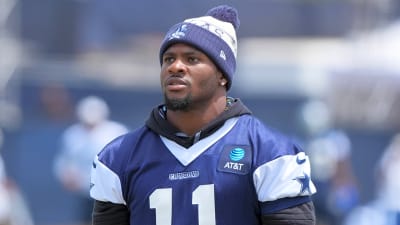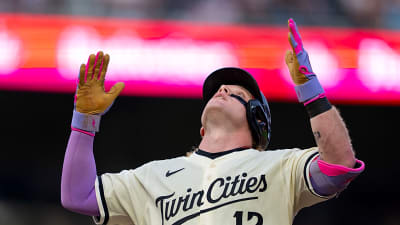
With the 2025 MLB trade deadline officially in the rearview mirror, there are still many of the top starting pitchers everyone thought would be moved that still remain on their same team. Everyone knew it was going to be a very competitive market, and maybe that market simply got too competitive, so everyone backed out.
Some of the top starters that most expected to be on the move or teams were at least having conversations over, including Miami Marlins pitchers Sandy Alcantara and Edward Cabrera, Pittsburgh Pirates pitcher Mitch Keller, Arizona Diamondbacks pitcher Zac Gallen, and Washington Nationals pitcher Mackenzie Gore. That doesn't include guys called about but weren't as likely to be traded, like Minnesota Twins starter Joe Ryan and San Diego Padres starter Dylan Cease.
Yankees declined to give up either Spencer Jones or George Lombard Jr. for Sandy Alcantara. Marlins control Alcantara and Edward Cabrera for multiple years after 2025 so they needed something big. Cubs and Red Sox tried hardest there but no one came especially close.
— Jon Heyman (@JonHeyman) August 1, 2025
Chicago Cubs' president of baseball operations Jed Hoyer joined 670 The Score on Thursday to give some insight on why many of these starters didn't get traded at the deadline.
"Yeah, I mean, without going into it specifically, I think a lot of those guys would have not only taken off the major league team, but taken off the depth of our system. And you know, ultimately, we made the decision that those prices didn't make sense for us to be sustainably successful. And I think the market sort of said that no one else did either, right? We're not the only team that was in that market," Hoyer said. "There's a lot of teams looking for that kind of starting pitcher. And I think obviously the fact that everyone sort of made the same decision, it kind of tells you that the teams that those kind of pitchers, they really value them.
"It's hard to draft and develop and have a starting pitcher like that under control. So I think when teams do, rightfully, they expect a massive return to do it. And so, like I said, you know, we made that decision organizationally, that that was not the right thing for us, and obviously the fact that none of those guys changed hands indicates that we weren't alone."
There were many reports prior to the deadline that the starting pitching market had way more demand than supply, and teams would likely have to overpay to get a top-level starter. However, it looks like it went the other direction, and teams on the buying end didn't think overpaying was worth it.
The Cubs didn't get one of the top starting pitchers at the trade deadline, but they did make a few strong additions. Chicago traded for starting pitcher Michael Soroka, relievers Andrew Kittredge and Taylor Rogers, and utility man Willi Castro. All three players met the three needs the Cubs were looking for at the deadline, even if they weren't the best guys on the market.
Soroka can be the Cubs' third starter, or he could work out of the bullpen. Kittredge and Rogers give the Cubs strong depth and a combination of soft contact and swing and miss at the backend of their bullpen, and Castro gives Chicago a left-handed bat and fantastic utility defense.
With the addition of the four players, the Cubs didn't have to go deep into their top prospects. Chicago gave up two of their top 15 prospects to acquire Soroka, but the Cubs didn't end up giving away any of their top prospects that were talked about for the top starting pitchers available.
Jed Hoyer on the Cubs not being more aggressive at the trade deadline, notably to land more pitching: "It wasn't an unwillingness to part with prospects. It was sort of an unwillingness to go to that length we'd have to go, to the depth and volume that we'd have to go." pic.twitter.com/GskuAOH2nP
— 670 The Score (@670TheScore) August 1, 2025
"That literally is the that's the wrestling match over and over is ... At what expense are you doing this to your future? And listen like we had a lot of conversations about controllable starters, a lot of conversations about, you know, good relievers. I think ultimately it wasn't an unwillingness to part with prospects. It was sort of an unwillingness to go to that the length that we would have to go, and the depth and the volume we would have to go," Hoyer said. "So I think there's no question you have to be willing to depart with prospects to get really good players. I think the question is just how many, and at what cost."
Hoyer also added that this year's deadline was a weird one. Many teams were thought of as sellers, but ended up being buyers, and vice versa. It made it difficult to know exactly who was available versus who was off the table.
The Cubs, along with a few teams, didn't really make a blockbuster move the fan base wanted, but Hoyer believes they made the right moves.
"I'm a sports fan. I understand that, you know, people want that huge deal. They want the instant gratification. They want to see that number one starter, you know, walk through the door, and I totally understand that," Hoyer said. "But, you know, you I could list off countless examples of deals that very quickly turn sideways, like, oh my goodness, they gave up all this talent for, you know, for this, and so I think you're constantly trying to remind yourself, through your experience, of when you've been in this position before, how you've reacted.
Craig Counsell feels the #Cubs “successfully added to the foundation of the team” at the trade deadline:
— Jori Parys (@JoriParys) August 1, 2025
“This is a good baseball team. We’ve strengthened it and that’s what’s important.”
Added new RHP Michael Soroka will likely start Monday. @cbschicago pic.twitter.com/JKvWVXgBWK
"I think you try your hardest and push your hardest within your boundaries to make deals. But I think you can't be disappointed when, if you know you did the right thing for your organization."
Time will tell if the Cubs did enough at the trade deadline to set themselves up for a postseason run. However, to sounds like the asking price for many of the top starting pitchers available was simply too high. Too high for the Cubs to bite, and too high for many others as well.
More must-reads:
- The three most confusing MLB trade-deadline deals
- Did the Padres trade away their future?
- The '250-strikeout MLB seasons' quiz
Breaking News
Trending News
Customize Your Newsletter
 +
+
Get the latest news and rumors, customized to your favorite sports and teams. Emailed daily. Always free!








